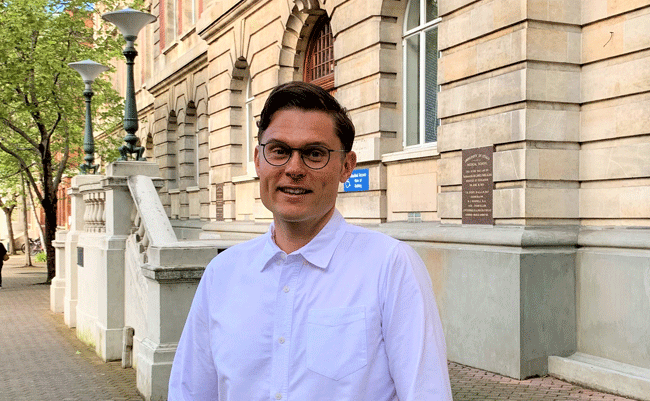A lot of health science research targets the most unwell and the things afflicting them. But researching how to help the healthy stay healthy is also a huge focus. Work from University of Otago researcher Dr Andrew Reynolds is becoming an increasingly important part of that focus. He talks to the Otago Bulletin Board about his research, his motivation and his hopes for the future.

Dr Andrew Reynolds, who was recently awarded a three-year Fellowship from the Heart Foundation.
Dr Reynolds, your research project is called “Carbohydrate quality in the management of established cardiovascular disease”. But aren't we often told carb quantity is what we should be worrying most about?
There is lots of confusion about carbohydrate intakes and their effect on health. Often people talk about the amount of carbohydrates, or about high carb versus low carb diets, but that is perhaps too simplistic.
Carbohydrates range from simple sugars, which in high intakes are associated with poorer health outcomes, to dietary fibres which in high intakes improve health. That distinction is lost when we only talk about carbohydrate amount. That is why my research is about the quality of carbohydrates. I'm looking at the benefits of those foods that are naturally high in fibre.
So you're talking about whole grains, for example, that sort of thing?
Well, yes we have good evidence to replace refined grain foods with wholegrain foods. Less type 2 diabetes, less stroke, less coronary heart disease, and less premature mortality.
Except whole grains in the food supply are actually changing so that now not all wholegrain foods deliver benefits. Whole grains are now finely milled and added to ultra-processed foods, along with added sugars, salt, and saturated fats. These ultra-processed foods are not often good for us, certainly not as good as the wholegrain foods our dietary guidelines recommend.
What we need to be thinking about and refocus on is which are the best carbohydrate-containing foods to eat. We know high intakes of whole grains, vegetables, legumes, and whole fruits are associated with improved health outcomes. My research is about measuring and understanding these benefits, and then looking at ways to protect and promote the intake of these food groups in New Zealand.
That sounds like really vital research, but really broad research, too.
It's globally relevant stuff, but has particular relevance for Māori and Pasifika people who have much higher rates of heart disease and type 2 diabetes. Those are perhaps the two main diseases I focus on, and will be working with over the three years as part of this Fellowship.
This appears to be the classic 'fence on the top of the cliff' approach, as opposed to the 'ambulance at the bottom of the cliff'.
Yes, my work sits firmly within public health, looking to prevent diseases or co-morbidities before they occur. I specifically look at making healthy eating and activities easier, as these lifestyle factors are important aspects of our long term health.
I accept that making changes to our diets and physical activity can be really hard. Especially without the right support, so my work is all about enabling those changes. I really like this approach; it has a greater potential to benefit the health of a lot of New Zealanders all at once. We know that less heart disease and type 2 diabetes reduces health costs and time spent in hospital. And there's a personal aspect as well – preventing disease enables whanau to keep living their normal lives. If you don't have heart disease or type 2 diabetes you take less medication, you attend fewer doctor appointments and you take less sick days.
You mention the personal aspect of this research; does some of your motivation come from personal experience?
It does, yes. Before going to university I worked with a colleague who had type 2 diabetes. He was always confused about what to eat, why his medications would be changed, and he'd begun to show some of the negative effects of poorly managed diabetes; vision issues and such.
He felt like all the responsibility was on him to manage his diabetes but he didn't have the information, or know what information to follow, to do so.
So yes, this was a motivation to me: first in regards to providing evidence-based health advice; but now more so in changing food environments to make the healthy choice the easy choice.
I am getting more and more interested in developing the evidence to change factors about the environment in which we live in so that healthier choices just happen, rather than put the onus on the individual to make all the changes.
With that in mind, and if you allow yourself to be optimistic, what do you see is the best-case outcome of your research?
That's easy; a best case scenario would be a reformulation of the food supply – changing what food is readily available in New Zealand so that healthier options are the default option on the shelf and don't cost extra.
An example of this might be having more intact whole grains in the food supply, replacing some of the finely milled refined grain products that are currently available.
You were recently awarded a three-year Fellowship from the Heart Foundation to help with this research. How vital is that sort of support?
The three-year fellowship with the Heart Foundation is an incredible opportunity. I am an early career researcher who needs to attract funding to pay for my role, and to do my projects. This Fellowship pays the next three years of my salary. Jackpot!
Having three years of job security means that I can commit to longer term projects, collaborate better with other researchers, and contribute more to health research in New Zealand.
I'll be conducting trials and running systematic reviews and meta-analyses looking at grain consumption and food processing on health outcomes of adults with established heart disease.